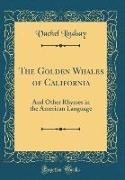Read more
Excerpt from The Golden Whales of California: And Other Rhymes in the American Language
The Independent, and William Stanley Braithwaite's anthology entitled Victory.
About the Publisher
Forgotten Books publishes hundreds of thousands of rare and classic books. Find more at www.forgottenbooks.com
This book is a reproduction of an important historical work. Forgotten Books uses state-of-the-art technology to digitally reconstruct the work, preserving the original format whilst repairing imperfections present in the aged copy. In rare cases, an imperfection in the original, such as a blemish or missing page, may be replicated in our edition. We do, however, repair the vast majority of imperfections successfully; any imperfections that remain are intentionally left to preserve the state of such historical works.
About the author
Nicholas Vachel Lindsay (1879 - 1931) was an American poet. He is considered a founder of modern singing poetry, as he referred to it, in which verses are meant to be sung or chanted. While in New York in 1905 Lindsay turned to poetry in earnest. He tried to sell his poems on the streets. Self-printing his poems, he began to barter a pamphlet titled "Rhymes To Be Traded For Bread", which he traded for food as a self-perceived modern version of a medieval troubadour. From March to May, 1906, Lindsay traveled roughly 600 miles on foot from Jacksonville, Florida, to Kentucky, again trading his poetry for food and lodging. From April to May, 1908, Lindsay undertook another poetry-selling trek, walking from New York City to Hiram, Ohio. From May to September 1912 he traveled-again on foot-from Illinois to New Mexico, trading his poems for food and lodging. During this last trek, Lindsay composed his most famous poem, "The Congo". Going through Kansas, he was supposedly so successful that "he had to send money home to keep his pockets empty". On his return, Harriet Monroe published in Poetry magazine first his poem "General William Booth Enters into Heaven" in 1913 and then "The Congo" in 1914. At this point, Lindsay became very well known. Additionally, W.E.B. Du Bois hailed Lindsay's story "The Golden-Faced People" for its insights into racism.

